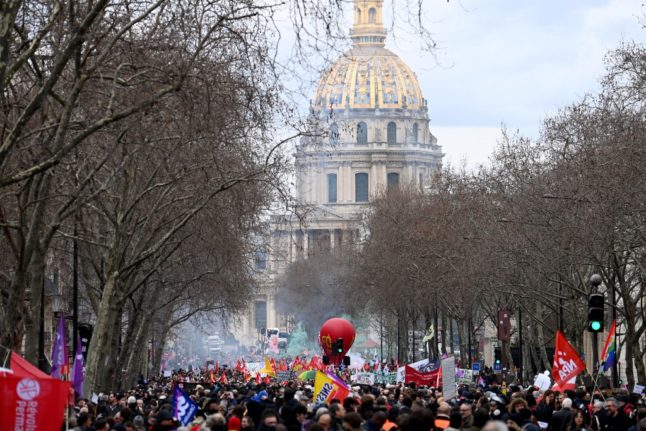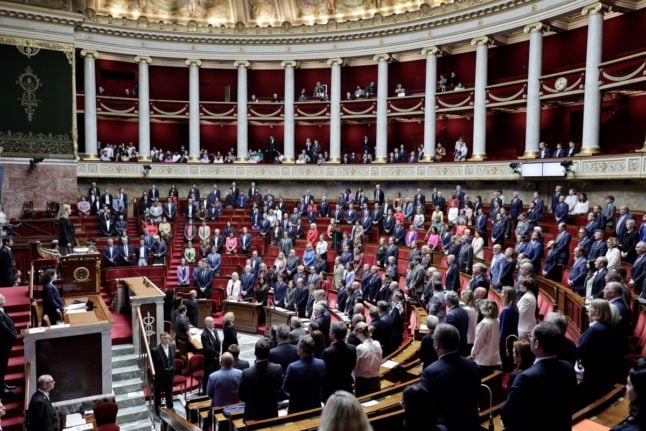After weeks of peaceful strikes and marches against raising the official retirement age from 62 to 64, police on Saturday closed the Place de la Concorde opposite parliament for demonstrations following two successive nights of clashes.
Some individual lawmakers were targeted, with Eric Ciotti — chief of the conservative Republicans party expected not to back the no-confidence motions — finding early Sunday that his constituency office had been pelted with rocks overnight.
“The killers who did this want to put pressure on my vote on Monday,” Ciotti wrote on Twitter, posting pictures showing smashed windows and threatening graffiti.
More than 80 people were arrested at a 4,000-strong Paris demonstration Saturday where some set rubbish bins on fire, destroyed bus stops and erected improvised barricades.
And 15 more were held in Lyon after police said “groups of violent individuals” triggered clashes.
Other demonstrations in cities around France passed off peacefully, with hundreds turning out in the Mediterranean port city Marseille.
“What do we have left apart from continuing to demonstrate?” said Romain Morizot, a 33-year-old telecoms engineer, at the Marseille protest.
After the government used a constitutional provision to bypass a parliamentary vote on pension reform, “now that will stoke social tensions everywhere,” Morizot added. “We’ll keep going, we don’t have a choice”.
Away from the streets of major cities, the hard-left CGT union said Saturday that workers would shut down France’s largest oil refinery in Normandy, warning that two more could follow on Monday.
So far, strikers had only prevented fuel deliveries from leaving refineries but not completely halted operations.
Industrial action has also halted rubbish collection in much of Paris, with around 10,000 tonnes of waste now on the streets as the government forces some binmen back to work.
A ninth day of wider strikes and protests is planned for Thursday.
People close to Macron told AFP that the president was “of course following developments” on the ground.
‘Add chaos to chaos’
Alongside raising the headline retirement age, Macron’s reform also increases the number of years people must pay into the system to receive a full pension.
The government says its changes are needed to avoid crippling deficits in the coming decades linked to France’s ageing population.
But opponents say the law places an unfair burden on low earners, women and people doing physically wearing jobs, and polls have consistently showed majorities opposed to the changes.
A survey of 2,000 people published in the Journal du Dimanche weekly on Sunday gave Macron an approval rating of 28 percent, its lowest since 2019’s mass “yellow vests” demonstrations against a new fuel tax.
READ ALSO: Could anti-Macron protests result in a Yellow Vest rerun in France?
After Prime Minister Elisabeth Borne used Article 49.3 of the constitution to pass the law without a vote in the lower house National Assembly, opponents’ last hope to block the reform is to topple the government in one of Monday’s no-confidence votes.
Labour Minister Olivier Dussopt told the JDD that “it’s not an admission of failure, but it’s heart-breaking” to have used the nuclear option to pass the reform.
The pensions changes were “too important to take the risk of playing Russian roulette,” he added, after weeks of concessions to the Republicans — long in favour of raising the retirement age — failed to bring enough conservative MPs on board to secure a majority.
Few lawmakers in the fractious Republicans group are expected to vote against the government in Monday’s no-confidence motions, brought by a small group of centrist MPs and the far-right National Rally.
Ciotti said he didn’t want to “add chaos to chaos”.



 Please whitelist us to continue reading.
Please whitelist us to continue reading.
Member comments